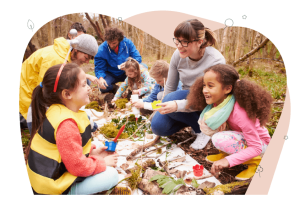5 Play and learning contemporary research
Research identifying the holistic benefits of play
Play has also been considered as having a therapeutic quality. According to psychoanalytical theorists Sigmund Freud, Anna Freud, Erik Erikson, and Leli Peller, play holds an important place in relation to children’s emotional development (McMahon & McMahon, 2003). Play provides the opportunity to fulfil desires and overcome traumatic events (Smith, 2010). The foundations of psychoanalytical theory are used by play therapists to assist children’s resolutions of problems and trauma (Russ, 2004). The findings and strategies of play-therapy provide a body of research that informs many teachers’ understanding of play as a tool for the development of student’s self-esteem, social processes, and social behaviours (Heidemann & Hewitt, 2010).
The importance of imaginary, pretend or dramatic play
In response to previous theories of play, Vygotsky proposed a more ‘progressive’ theory that encompassed imagination as a powerful tool to stimulate learning (Vygotsky, 2004). ‘Pure play’, as Vygotsky conceptualised, involves the activity of creating an imaginary situation, changing the properties of an object to become something else, and enacting the role of someone else (Vygotsky, 1978; Vygotsky, 1998). This draws attention to the importance of what is now called imaginary, pretend, or dramatic play.

Children as active learners and the significance of play
Research has identified play to be a vehicle for the learning and development of a wide range of capabilities and skills, such as self-regulation (Vygotsky, 1978; Ivanova, 2000; Hoffman, 2020); language (Smilansky & Shefatya, 1990; Stagnitti & Jelli, 2006; Stagnitti, 2004; Stagnitti, 2014; Stagnetti,1998) and executive function associated with metacognitive learning processes (Bodrova & Leong, 2007; Karpov, 2005; 2014).
Play serves important functions for young learners to be:
- active explorers of their environments through child-initiated discovery (Nolan, Kilderry & O’Grady 2006),
- creators of new experiences, and
- participants in constructing their own knowledge (Stevens, Raban, & Nolan, 2014).
The research highlights that the cognitive processes used by students in play, stimulate and integrate a wide range of intellectual, physical, social, emotional, and creative capabilities to foster high-level learning (Hall & Robinson, 2000; Whitebread et al., 2009). For example, it’s well documented in the literature that play makes a significant contribution to a child’s oral language (Stagnitti, Paatsch, Nolan and Campbell, 2020), as well as literacy and social development (Suhonen et al., 2015).

Keep in mind
Play is regarded as a mechanism through which young children become powerful learners, competent problem-solvers, and develop higher-order cognitive functioning (Whitebread et al., 2009). Play, in particular imaginative play, has been directly linked with children’s abilities to think abstractly and realistically to take the perspectives of others, and to strengthen their narrative development (Ferholt et al., 2015).

